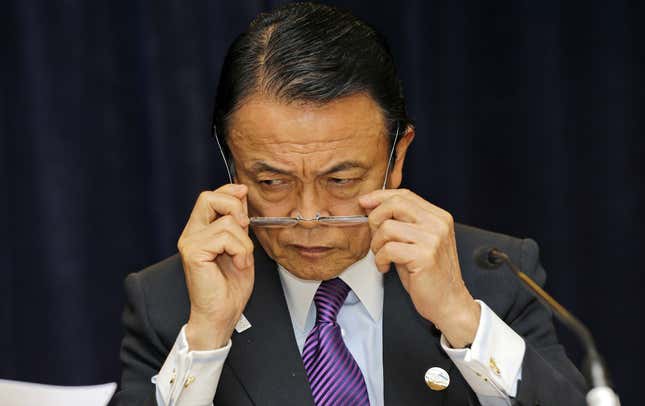
Just as a border stand-off between China and India has ended, another Asian front may be getting dicey. Japan’s deputy prime minister on May 5 said his country and China have almost never—in their entire histories!—gotten along. “Japan has had maritime contacts [with China], but for the past 1,500 years and more, there has never been a history when our relations with China went extremely smoothly,” Japan’s Taro Aso told business leaders in India on May 5.
That level of hindsight takes us back to pre-republic, dynastic rule in China and Japan. The first recorded battle between what are today the nations of China and Japan took place in 663 AD: the Battle of Baekgang. Various other flash points and full-on crises along the way include the first and second Sino-Japanese wars, Japan’s capture of Nanjing, and a recent row over a set of islands in the East China Sea.
On one hand, Aso’s remarks could have been a bad attempt at tempering concerns about rising tension between the two Asian powerhouses—as if to say, hey, things have always been rough between our countries; this recent spat is just a drop in the bucket. But that’s unlikely, given that last month Aso visited Japan’s Yasukuni shrine, which houses war criminals from World War II. Visiting the shrine is seen almost as a direct diplomatic snub in China, South Korea, and other parts of Asia that were once under Japanese occupation.
Another scenario is that Aso is giving India and other South Asian countries reason to partner with Japan economically and perhaps militarily, too. Analysts have conjectured that a more hawkish Japanese administration—under Shinzo Abe, who has called for revising the country’s pacifist constitution—may be trying to strengthen alliances in the region to counter Chinese power. Before his visit to India, Aso was in Sri Lanka, where he hailed a proposal to train the country’s coast guards and said, “Relations with democratic nations that have established market economies and the rule of law are extremely important.” That was another jab at China, this time more subtle.
But this isn’t the beginning of a Japanese-led hot-or-cold war against China just yet. A report published last week by the Carnegie Foundation on China concludes that Japanese policymakers haven’t formed a consensus (pdf, p.5) on responding to this so-called China threat. China’s growing military might isn’t often discussed publicly in Japan. Officials regard economic ties between the two countries as too important, and Japanese people are generally against more military spending and moves away from Japan’s pacifist status, the report says.
Flux in Japanese politics could even be a temporary boon for peace. The report adds, “Any clear or decisive moves by Tokyo… are further constrained by general policy paralysis resulting from the current instabilities and uncertainties of Japan’s domestic political process and overall focus on internal reform.”